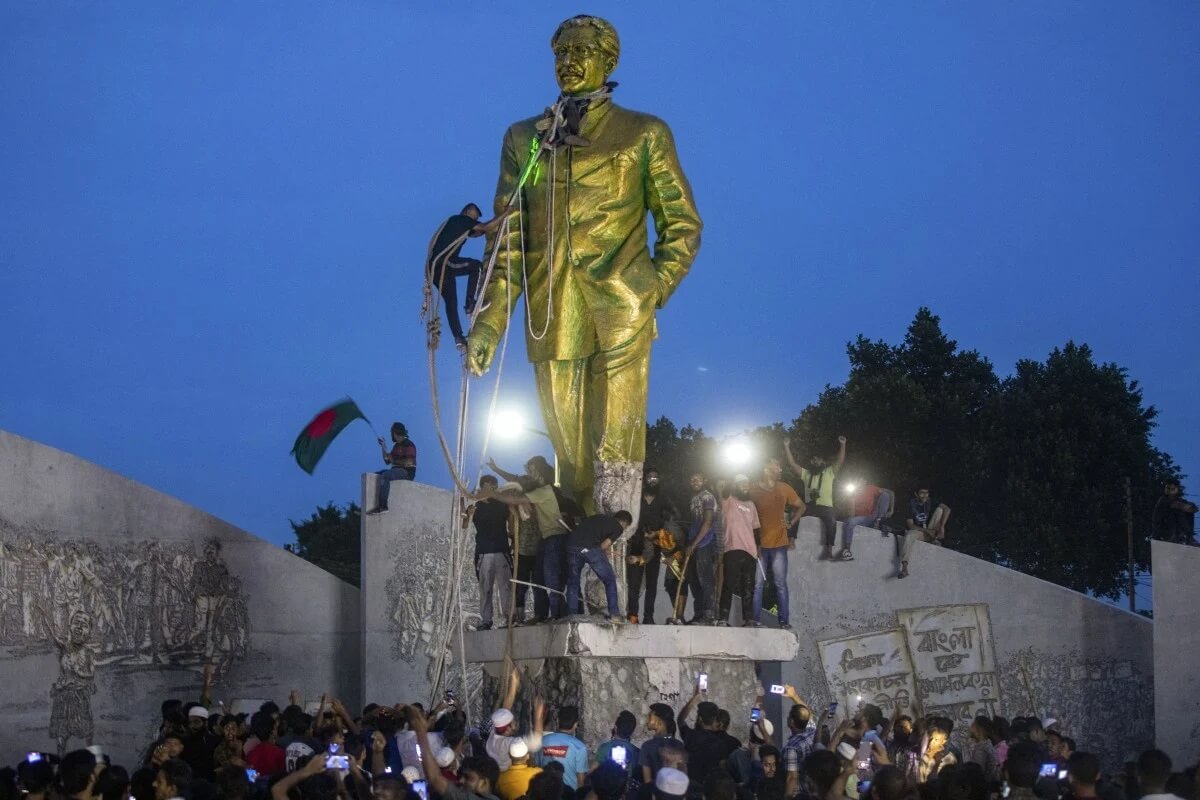Sheikh Hasina’s Fall in Bangladesh Shows History’s Cruel Irony
Commodore C. Uday Bhaskar | 16 August 2024
The ousting of the leader marks the end of a period characterised by the kind of oppression her father fought against in Bangladesh’s birth
An unexpected and dramatic development plunged Bangladesh into turmoil on Monday as Prime Minister Sheikh Hasina abruptly resigned after 15 years in power and fled to India in a military aircraft. This ignominious exit followed weeks of student-led protests over the job quota system and brutal reprisals by security forces.
Images of jubilant protesters ransacking the prime minister’s residence testify to the intensity of the anti-Hasina sentiment. This was reminiscent of what happened in Colombo in July 2022, when then-president Gotabaya Rajapaksa fled Sri Lanka amid similar protests and the ransacking of the presidential palace.
Bangladesh is a relatively new nation. It was known as East Pakistan before being born as an independent nation in 1971 after a war of liberation from Pakistan in which India played a major role. The unseating of Hasina has been described as the second liberation of Bangladesh.
This is deeply ironic as Hasina’s father Sheikh Mujibur Rahman was the founding father of the fledgling nation and had fought against the oppressive, genocidal rule of the Pakistan army. The same charges are now being levelled against his daughter; the blood-soaked rhythms of history add to the trauma of Bangladesh and its collective memory.
Bangladesh army chief General Waker-uz-Zaman, who was appointed in June, has taken control of the troubled nation. He has assured the country that an interim government will soon be formed. The country’s parliament has been dissolved to pave the way for fresh elections which were among the key demands of the student protesters.
The army, which has long played an influential role in Bangladesh’s politics, will continue to do so in an effort to control the current turbulence. It will oversee the formation of an interim government and prepare the country for free and fair elections, the kind that Hasina has neglected during the past decade.
Nobel Peace Prize winner and microfinance pioneer Muhammad Yunus has reportedly been appointed as the chief adviser to the interim government, a demand made by the students who are wary of yet another cycle of army rule. Even so, the army will be required to stabilise a domestic political environment riddled with deep fissures and a divided public.
Bangladesh, which is predominantly Muslim, is split between an old guard that is supportive of Pakistan and its ideology rooted in Islam and the veterans of the 1971 liberation war who inherited Mujib’s mantle and share his vision of a moderate, secular state. The Awami League and the Bangladesh National Party are the main political parties, but the now-banned Jamaat-e-Islami party has emerged as a significant voice and could be included in the interim government.
The current protests appear to have gained traction in an organic manner with no clear political affiliation or direction aside from demanding better governance and free and fair elections. Assuaging public discontent and dealing with bitterly opposed political factions will be difficult for the interim government. The economy appears to be fragile and major international backers have distanced themselves from Hasina’s administration over its policies of domestic repression.
Under Hasina, Bangladesh engaged with all the major powers but had an apparent tilt towards India. South Asian states have sought to maximise their engagement with both New Delhi and Beijing and their related benefits, and in recent years China has stepped up its own presence in the Indian periphery, much to Delhi’s dismay.
The manner in which Hasina fled the country is a major setback for Indian foreign policy amid Delhi’s significant support for her rule, largely out of security and strategic considerations. As a result, India could find itself alienated from both Bangladesh and its people.
The immediate priority for Delhi will be confirming the personal safety and political status of Hasina. The latest reports suggest the UK is unwilling to extend full protection from potential investigations, while the United States has refused to comment on reports that Washington revoked Hasina’s visa.
‘Our country has been liberated’: Bangladeshis celebrate as prime minister resigns and flees
If Hasina stays in India for an extended period, it will not be the first time she has received such shelter. When her father was assassinated in 1975, then-Indian prime minister Indira Gandhi took Hasina under her protection and helped her return to Bangladesh to strengthen the country’s nascent democracy. It is ironic that Hasina is now guilty of thwarting the same democratic impulse in a ruthless manner.
This is a heavy cross to bear as the Sheikh Mujibur legacy has been sullied, symbolised poignantly by the imposing statue of Bangladesh’s founding father being torn from its pedestal in Dhaka. The rhythms of history can be unforgiving of authoritarian hubris.
Commodore C. Uday Bhaskar is director of the Society for Policy Studies (SPS), an independent think tank based in New Delhi.
This article was originally published on South China Monitoring Post.
Views in this article are author’s own and do not necessarily reflect CGS policy.
